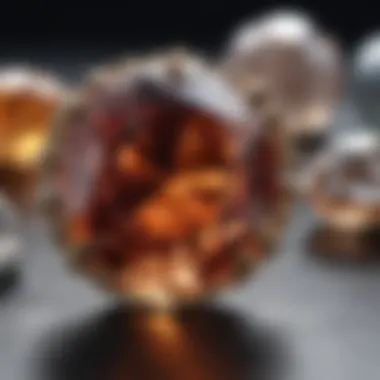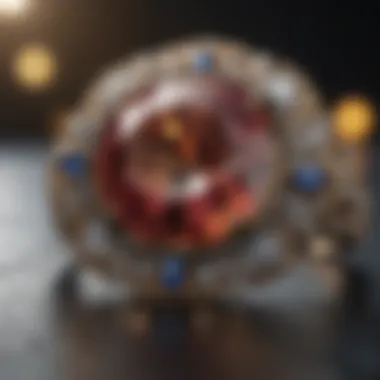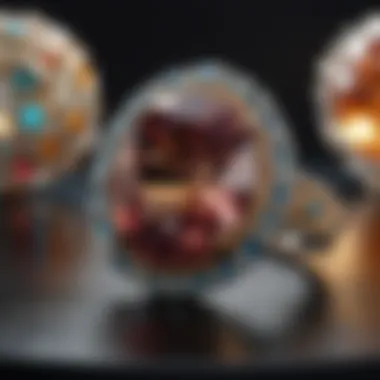Expert Guide: Selling Your Jewelry to Maximize Value


Overview of Gemstones and Minerals
Gemstones have fascinated humanity for centuries, with their enticing beauty and allure. The history of gemstones and minerals traces back to ancient civilizations, where they were treasured for their rarity and perceived mystical properties. These exquisite stones hold great significance in culture and society, symbolizing wealth, status, and even spiritual beliefs. From royal crowns to amulets, gemstones have remained a prominent feature in adornments and artifacts throughout history.
Gemstone Formation and Properties
The formation of gemstones is a meticulous process that unfolds over millions of years. These precious stones are created through the combination of geological elements and immense pressure deep within the Earth's crust. Each gemstone possesses unique properties that define its characteristics, including color, hardness, and luster. These properties play a crucial role in determining the rarity and value of a gemstone, making them highly sought after by collectors and connoisseurs alike.
Types of Gemstones
Gemstones are broadly categorized into precious and semi-precious categories based on their rarity and market demand. While precious gemstones like diamonds, rubies, sapphires, and emeralds command high prices due to their scarcity, semi-precious stones such as amethyst, garnet, and turquoise offer a more affordable yet equally bewitching alternative. Additionally, there exist a myriad of common, exotic, and rare gemstone varieties, each with its own distinct beauty and allure that captivates gemstone enthusiasts worldwide.
Identifying and Evaluating Gemstones
The value of a gemstone is influenced by a multitude of factors, including clarity, cut, color, and carat weight. Proper techniques for gemstone identification involve assessing these qualities to determine the overall quality and potential worth of the stone. Gemologists employ various tools and tests to evaluate gemstone quality accurately, ensuring that buyers and sellers make informed decisions when trading these precious stones.
Caring for Gemstones
To preserve the beauty and quality of gemstones, proper care and maintenance are essential. Cleaning gemstones regularly with mild soap and water, and storing them in soft pouches or cloth-lined boxes can prevent scratching and dulling of the stones. Avoiding common mistakes in gemstone care, such as exposure to harsh chemicals or extreme temperatures, is vital to safeguarding their brilliance and longevity. Furthermore, specific gem types require customized preservation techniques to maintain their unique characteristics and value over time.
Understanding Your Jewelry's Worth
Understanding the worth of your jewelry is a crucial aspect to maximize its value when selling. It involves delving into various factors such as gemstone quality, brand recognition, and current market trends to make informed decisions. By evaluating these key elements meticulously, you can ensure that you get the best returns on your valuable possessions. Knowing your jewelry's worth not only helps in setting appropriate pricing strategies but also aids in effectively communicating its value to potential buyers.
Evaluating Gemstone Quality
Gemstone quality plays a pivotal role in determining the overall value of jewelry pieces. When assessing gemstones, factors like the 4Cs (Cut, Clarity, Color, and Carat Weight) come into play. The cut of a gemstone affects its brilliance and sparkle, while clarity measures the presence of any imperfections or inclusions. Color determines the gemstone's hue and saturation, influencing its attractiveness and rarity. Carat weight indicates the size of the gemstone, with larger stones generally being more valuable. Understanding and prioritizing these aspects enable sellers to accurately grade and price their jewelry based on gemstone quality.
Assessing the 4Cs: Cut, Clarity, Color, and Carat Weight
When assessing the 4Cs, each factor contributes uniquely to the overall quality of a gemstone. The cut of a gemstone dictates its ability to reflect light, enhancing its brilliance and fire. Clarity assesses the gemstone's transparency and purity, with flawless stones commanding higher prices. Color grading determines the presence of tints or hues within the gemstone, with vivid and saturated colors being more desirable. Carat weight directly correlates to the size and rarity of the gemstone, influencing its price per carat. Incorporating the evaluation of the 4Cs into the jewelry selling process ensures accurate pricing and enhances buyer confidence in the gemstone's quality.
Identifying Gemstone Treatments and Enhancements
In addition to the natural characteristics of gemstones, sellers must also consider any treatments or enhancements that the stones have undergone. Identifying these treatments is essential as they can affect the gemstone's durability, color, and overall value. While some enhancements like heat treatments may improve the appearance of a gemstone, others like fracture filling may impact its long-term stability. By disclosing any treatments or enhancements, sellers uphold transparency and build trust with potential buyers, adding credibility to their jewelry pieces.
Appraising Jewelry Brands


Recognizing prestigious jewelry brands holds significance in determining the value of jewelry pieces. Well-known brands often command higher prices due to their reputation for quality craftsmanship and design innovation. When appraising jewelry brands, factors such as brand heritage, popularity among collectors, and exclusivity influence the perceived value of the piece. Understanding the intrinsic value associated with reputed brands allows sellers to leverage brand recognition to attract discerning buyers and secure premium prices for their jewelry.
Recognizing Prestigious Jewelry Brands
Prestigious jewelry brands epitomize excellence in craftsmanship and aesthetic appeal, setting them apart in the competitive jewelry market. Recognizing these brands provides insight into the quality standards upheld by the manufacturer, reassuring buyers of the piece's authenticity and superior design. The prestige associated with renowned brands adds a premium to the jewelry's value, making it a desirable investment for collectors and enthusiasts alike.
Factors Influencing Brand Value
Several factors contribute to the overall value of a jewelry brand, influencing consumer perceptions and market demand. Brand recognition, artistic collaboration, limited editions, and historical significance all play a role in shaping brand value. Jewelry brands that effectively communicate their unique selling points and connect with their target audience tend to maintain a strong market presence and enduring appeal. By evaluating these factors, sellers can position their brand effectively in the market and differentiate their jewelry offerings to stand out among competitors.
Assessing Market Trends
Staying abreast of current market trends is essential for understanding consumer preferences and evaluating market demand. By analyzing market trends, sellers can align their jewelry collections with popular styles, materials, and designs that resonate with buyers. Market trends also dictate pricing strategies and promotional efforts to capitalize on emerging opportunities and meet evolving consumer demands effectively.
Understanding Consumer Preferences
Consumer preferences encompass a wide range of factors that influence jewelry purchasing decisions. From design aesthetics to cultural influences, understanding what drives consumer choices enables sellers to tailor their offerings to align with market demands. By identifying popular styles, motifs, and materials favored by consumers, sellers can curate jewelry collections that cater to diverse tastes and preferences, maximizing the appeal of their products.
Evaluating Market Demand
Evaluating market demand involves analyzing the popularity of certain jewelry styles, brands, and designs within the current market landscape. High demand for specific types of jewelry indicates consumer interest and willingness to purchase, presenting opportunities for sellers to capitalize on lucrative trends. By assessing market demand, sellers can optimize their inventory selection, pricing strategies, and marketing campaigns to effectively meet customer needs and maximize sales potential.
Preparing Your Jewelry for Sale
Preparing your jewelry for sale is a crucial step in maximizing its value. This section focuses on the essential elements that can enhance the appeal and worth of your jewelry pieces. By emphasizing topics such as professional cleaning and maintenance, photographing your jewelry, and pricing strategies, sellers can significantly impact the success of their sales.
Professional Cleaning and Maintenance
Professional cleaning plays a vital role in revitalizing the luster and allure of your jewelry items. By discussing the benefits of professional cleaning, sellers can understand the significant impact this service can have on enhancing the overall presentation and value of their pieces. The meticulous attention to detail and specialized techniques employed in professional cleaning ensure that jewelry regains its brilliance and eye-catching sparkle, thus attracting potential buyers more effectively.
Tips for Jewelry Maintenance
In addition to professional cleaning, maintaining jewelry properly is essential for preserving its quality and longevity. This subsection sheds light on practical tips for jewelry maintenance, offering valuable insights into preventative measures that sellers can take to safeguard their pieces. By highlighting the significance of routine maintenance practices, sellers can ensure that their jewelry retains its beauty and durability, further increasing its overall value and desirability.
Photographing Your Jewelry
Capturing high-quality images of your jewelry is an indispensable aspect of preparing for a successful sale. The subsection delves into the importance of presenting your pieces in the best light through visually appealing photographs. By elucidating the impact of high-quality images, sellers can comprehend how such visuals significantly influence the perception and interest of potential buyers, ultimately facilitating quicker and more profitable sales.
Optimizing Lighting and Angles


When photographing jewelry, paying attention to lighting and angles is paramount for showcasing its unique features and craftsmanship. This section explores the art of optimizing lighting and angles to accentuate the finer details and beauty of each piece. By mastering techniques that enhance visual appeal, sellers can create compelling images that effectively highlight the quality and elegance of their jewelry, captivating the attention of discerning buyers.
Pricing Strategies
Determining the fair market value of jewelry is a critical aspect of preparing for sale. This segment delves into the intricacies of pricing strategies, offering guidance on evaluating market trends and setting competitive prices. By exploring the methodology behind determining fair market value, sellers can attain a comprehensive understanding of pricing dynamics, enabling them to make informed decisions that optimize profitability and expedite successful transactions.
Negotiation Tactics
Effective negotiation tactics are instrumental in securing favorable deals and realizing the full value of jewelry pieces. This section outlines strategic approaches to negotiation, empowering sellers to navigate discussions confidently and adeptly. By highlighting the importance of tactful communication and strategic bargaining, sellers can boost their chances of achieving mutually beneficial agreements that maximize returns and cultivate lasting buyer relationships.
Choosing the Right Sales Channel
In the realm of selling jewelry, choosing the right sales channel holds significant importance. It can dictate the success of your venture and impact the value you receive for your prized possessions. Selecting the appropriate sales channel involves a careful consideration of factors such as target audience reach, security measures, and financial aspects. By understanding the intricacies of each sales channel option, you can make an informed decision that aligns with your goals. Whether you opt for online platforms, local jewelers, or direct sales to individuals, choosing wisely can enhance the overall selling experience and optimize the value you derive from your jewelry.
Online Platforms
When it comes to online platforms for selling jewelry, the landscape is vast and varied, offering numerous opportunities for showcasing and selling your pieces. Popular websites dedicated to the sale of jewelry provide a convenient platform for connecting with potential buyers worldwide. These websites typically have a wide reach, attracting a diverse audience of jewelry enthusiasts and collectors. They offer an efficient way to display your pieces through high-quality images and detailed descriptions, enhancing the visibility of your listings in a competitive market. Leveraging popular websites for selling jewelry can significantly increase the chances of reaching interested buyers and achieving favorable sales prices.
Popular Websites for Selling Jewelry
Exploring popular websites tailored for selling jewelry can offer sellers a competitive edge in the digital marketplace. These platforms are designed to showcase jewelry in an appealing manner, utilizing visual aesthetics to attract potential buyers. Popular websites often incorporate features such as secure payment gateways, seller protection policies, and user-friendly interfaces, streamlining the selling process for both sellers and buyers. By utilizing these platforms, sellers can tap into a broader audience base, interact with buyers from diverse backgrounds, and establish a reputation for offering quality jewelry pieces.
Tips for Ensuring Security
In the realm of online jewelry sales, ensuring security is paramount to fostering trust between sellers and buyers. Tips for safeguarding transactions include verifying buyer credentials, using secure payment gateways, and maintaining clear communication throughout the sales process. By prioritizing security measures, sellers can create a safe selling environment, mitigating the risks associated with online transactions and protecting their valuable assets.
Local Jewelers and Auction Houses
For sellers seeking a more personalized selling experience, engaging with local jewelers and auction houses can offer distinct advantages. Local sales channels provide sellers with the opportunity to interact directly with buyers, showcasing jewelry in a tangible setting and building relationships within the local community. Auction houses, on the other hand, offer a platform for selling jewelry through competitive bidding, potentially fetching higher prices for unique or premium pieces. Navigating local sales channels requires a nuanced approach, balancing factors such as market demand, seller reputation, and negotiation skills to maximize the value of jewelry pieces.
Benefits of Local Sales
Engaging in local sales presents sellers with the benefit of establishing a personal connection with buyers, fostering trust and loyalty within the community. Local jewelers often have a loyal customer base seeking unique or customized jewelry pieces, providing sellers with a targeted audience for their offerings. By leveraging the personal touch of local sales, sellers can showcase the intricate details of their jewelry, convey the story behind each piece, and offer a personalized selling experience that resonates with buyers.
Navigating Auction Processes
Participating in auction processes can be a lucrative option for selling jewelry, particularly for pieces with a niche appeal or historical significance. Navigating auction processes involves understanding auction dynamics, setting reserve prices, and engaging with potential buyers to generate competitive bidding. Auction houses provide a platform for sellers to reach high-net-worth individuals, collectors, and enthusiasts willing to pay a premium for quality jewelry pieces. By mastering the intricacies of auction processes, sellers can harness the excitement of bidding wars and secure optimal prices for their valuable jewelry.


Direct Sales to Individuals
Direct sales to individuals offer sellers a direct and personalized approach to selling jewelry, focusing on building trust and establishing meaningful connections with buyers. By engaging buyers on a one-on-one basis, sellers can convey the unique qualities of their jewelry pieces, share insights on craftsmanship and design, and tailor the sales experience to meet individual preferences. Building trust with buyers is paramount in direct sales, as it forms the foundation of successful transactions and fosters long-term relationships based on transparency and integrity.
Building Trust with Buyers
Building trust with buyers involves creating a transparent selling process, providing detailed information about jewelry pieces, and addressing buyer inquiries promptly and accurately. By demonstrating honesty, expertise, and a genuine passion for jewelry, sellers can instill confidence in buyers, leading to positive purchasing decisions and repeat business opportunities. Establishing trust is a collaborative effort that hinges on effective communication, mutual respect, and a shared appreciation for the beauty and craftsmanship of jewelry.
Ensuring Safe Transactions
Ensuring safe transactions in direct sales requires implementing secure payment methods, verifying buyer identities, and documenting sales agreements to protect both parties involved. By prioritizing safe transaction practices, sellers can minimize risks associated with fraud, disputes, and miscommunications, safeguarding the integrity of their selling process and preserving the value of their jewelry. Creating a secure selling environment promotes buyer satisfaction, encourages repeat business, and solidifies the seller's reputation as a trustworthy source for quality jewelry.
Maximizing the Sale
Maximizing the sale of jewelry is a critical aspect discussed in this article. When it comes to selling your valuable possessions, the aim is to obtain the best possible returns. By focusing on strategies that enhance the sale value of your jewelry pieces, you can ensure a successful and lucrative transaction. Understanding the market dynamics and employing effective negotiation techniques are indispensable elements in this process. Moreover, prioritizing legal considerations and post-sale care plays a crucial role in securing a seamless selling experience.
Negotiation Techniques
Strategies for Effective Negotiation
Strategies for effective negotiation are central to maximizing the sale of your jewelry. These strategies involve leveraging your knowledge of the market trends, understanding the buyer's perspective, and setting clear objectives. By adopting a proactive approach and showcasing the unique features and qualities of your jewelry pieces, you can position yourself strongly during negotiations. Additionally, being open to compromises while maintaining your bottom-line value can lead to mutually beneficial outcomes.
Setting Realistic Expectations
Setting realistic expectations is vital when negotiating the sale of jewelry items. By accurately assessing the market value of your pieces and understanding your bargaining power, you can establish realistic goals for the selling process. This pragmatic approach helps in managing both your expectations and those of potential buyers, fostering transparency and trust. Moreover, by setting achievable targets, you enhance the likelihood of closing deals satisfactorily, contributing to a positive selling experience.
Legal Considerations
Understanding Contracts and Agreements
Understanding contracts and agreements is an essential aspect of selling jewelry. Clarifying the terms and conditions of the sale, including payment methods, return policies, and warranties, safeguards your rights as a seller. By ensuring that legal documents are comprehensive and in alignment with industry standards, you mitigate risks and establish a secure transaction framework. Moreover, clear communication of contractual obligations fosters accountability and professionalism, enhancing the credibility of the selling process.
Protecting Your Rights as a Seller
Protecting your rights as a seller involves implementing measures to prevent fraud and disputes during the selling process. By asserting your ownership rights, disclosing relevant information about the jewelry, and verifying the authenticity of buyers, you safeguard yourself against potential legal challenges. Creating a legally sound selling environment not only protects your interests but also promotes fair and ethical business practices, reinforcing trust between parties.
Post-Sale Care
Ensuring Proper Transfer of Ownership
Ensuring the proper transfer of ownership is crucial once a jewelry sale has been finalized. Verifying the completion of payment, providing detailed invoices, and documenting the transfer of possession are integral steps in this process. By adhering to established procedures and seeking legal guidance if necessary, you can avoid complications related to ownership disputes and ensure a smooth transfer process. Safeguarding the continuity of ownership safeguards your rights as a former owner and promotes clarity in ownership transitions.
Insurance and Documentation
Insurance and documentation play a vital role in securing the value of jewelry items post-sale. Obtaining comprehensive insurance coverage for high-value pieces protects against unforeseen events such as theft, damage, or loss. Additionally, maintaining thorough documentation of the transaction details, including receipts, certifications, and appraisals, enhances the accountability and traceability of the sale. By prioritizing insurance and documentation, you create a layer of security that preserves the value and authenticity of your jewelry collection.







